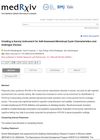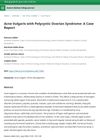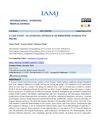 January 2023 in “Sibirskij medicinskij vestnik”
January 2023 in “Sibirskij medicinskij vestnik” Women with PCOS are more vulnerable to severe COVID-19 and related health issues.
 February 2024 in “International journal of health, medicine and nursing practice”
February 2024 in “International journal of health, medicine and nursing practice” Raising awareness about PCOS can improve women's quality of life.

In 2020, a new online survey was made to help identify Polycystic ovary syndrome (PCOS) in women, but it needs some improvements for better understanding and accuracy.
 2 citations,
April 2021 in “Reproductive health of woman”
2 citations,
April 2021 in “Reproductive health of woman” Most women with polycystic ovary syndrome (PCOS) have menstrual issues, infertility, acne, and excessive body hair, with the most common type being the non-androgenic phenotype.
 June 2022 in “Foodsci: Indian journal of research in foods and nutrition”
June 2022 in “Foodsci: Indian journal of research in foods and nutrition” Eating better, exercising, staying clean during periods, and learning about health can help reduce menstrual problems and improve life quality.
 2 citations,
March 2016 in “InnovAiT”
2 citations,
March 2016 in “InnovAiT” PCOS is a common hormonal disorder in women, often involving menstrual issues and increased diabetes risk, managed through lifestyle changes and targeted treatments.
 149 citations,
June 2002 in “British Journal of Dermatology”
149 citations,
June 2002 in “British Journal of Dermatology” Minoxidil works better for female hair loss, but cyproterone reduces scalp oiliness and causes menstrual issues.
 34 citations,
January 2008 in “International Review of Neurobiology”
34 citations,
January 2008 in “International Review of Neurobiology” Epilepsy and certain epilepsy drugs can lead to reproductive problems in women, but changing medication might improve these issues.

Antiepileptic drugs can cause cosmetic side effects and affect menstrual cycles, fertility, and bone health in women with epilepsy.
 4 citations,
March 2013 in “Neuropsychiatric Disease and Treatment”
4 citations,
March 2013 in “Neuropsychiatric Disease and Treatment” A woman with anorexia and Cushing's syndrome improved after tumor removal, highlighting the need to consider hormonal issues in psychiatric conditions.
 December 2024 in “Eastern Medical College Journal”
December 2024 in “Eastern Medical College Journal” Acne and PCOS are linked due to hormonal imbalances and metabolic issues.
 4 citations,
June 2007 in “PubMed”
4 citations,
June 2007 in “PubMed” Effective management of PCOS includes lifestyle changes, medication for menstrual regulation, fertility treatments, and cosmetic issue remedies.
 February 2022 in “Research Square (Research Square)”
February 2022 in “Research Square (Research Square)” High levels of Anti-Müllerian Hormone (AMH) in the blood can strongly predict Polycystic Ovarian Syndrome (PCOS) and related issues in women of reproductive age.
28 citations,
January 2017 in “Obstetrician & gynaecologist/The obstetrician & gynaecologist” The document concludes that managing PCOS effectively requires considering ethnic differences, obesity's impact, and ethical concerns in treatment approaches.
 3 citations,
January 2007 in “Elsevier eBooks”
3 citations,
January 2007 in “Elsevier eBooks” The document concludes that individualized treatment and lifestyle changes are important for managing menopause symptoms and health risks.
 2 citations,
October 2022 in “Frontiers in genetics”
2 citations,
October 2022 in “Frontiers in genetics” Late diagnosis of congenital adrenal hyperplasia can greatly affect physical development, gender identity, and sexual health.
 24 citations,
September 2001 in “Journal of The American Academy of Dermatology”
24 citations,
September 2001 in “Journal of The American Academy of Dermatology” Women's ovarian hormones and adrenal androgens change throughout life, affecting hair loss and health.
April 2014 in “The FASEB Journal” Women with androgenetic alopecia often have other symptoms of high androgen levels, requiring further hormone testing.
 2 citations,
November 2020 in “Fertility Research and Practice”
2 citations,
November 2020 in “Fertility Research and Practice” The survey helps identify menstrual irregularities and excess male hormones, aiming to detect conditions like Polycystic Ovary Syndrome.
 2 citations,
May 2017 in “International journal of reproduction, contraception, obstetrics and gynecology”
2 citations,
May 2017 in “International journal of reproduction, contraception, obstetrics and gynecology” Myoinositol helps improve menstrual cycles and some skin issues in women with PCOS.
 2 citations,
December 2022 in “Journal of Clinical Medicine”
2 citations,
December 2022 in “Journal of Clinical Medicine” Medications for glucose metabolism and weight control, combined therapy options, and herbal medicines may help regulate menstrual cycle in adolescents with PCOS.
 34 citations,
June 2010 in “Archives of Disease in Childhood”
34 citations,
June 2010 in “Archives of Disease in Childhood” Menstrual disorders are common in adolescents and can be influenced by weight, activity, and health issues, requiring careful evaluation and more research for effective treatment.
 75 citations,
June 1999 in “Pediatric Clinics of North America”
75 citations,
June 1999 in “Pediatric Clinics of North America” The document concludes that early recognition and treatment of PCOS in adolescents is crucial for managing symptoms and long-term health risks.
 16 citations,
December 2007 in “Expert Review of Pharmacoeconomics & Outcomes Research”
16 citations,
December 2007 in “Expert Review of Pharmacoeconomics & Outcomes Research” PCOS lowers quality of life, causing issues like obesity, infertility, and menstrual problems.
 6 citations,
April 2019 in “Journal of Pediatric Endocrinology and Metabolism”
6 citations,
April 2019 in “Journal of Pediatric Endocrinology and Metabolism” Metformin improved menstrual cycle regularity and signs of hyperandrogenism in adolescent girls with type 1 diabetes but did not improve blood sugar control.
 13 citations,
June 2018 in “Journal of Womens Health”
13 citations,
June 2018 in “Journal of Womens Health” Combination therapy with oral contraceptives and spironolactone improves hair growth, menstrual issues, and acne in women with PCOS.
1 citations,
January 2020 in “Bioscience Reports” Long-term use of finasteride in women can cause hormonal changes, DNA damage, and menstrual issues.
 16 citations,
January 2007 in “Journal of Obstetrics and Gynaecology”
16 citations,
January 2007 in “Journal of Obstetrics and Gynaecology” The document suggests various treatments for PCOS, including medication for menstrual issues, insulin resistance, and excess hair, as well as fertility treatments, while highlighting the need for personalized care and lifestyle changes.
 January 2024 in “International Ayurvedic medical journal”
January 2024 in “International Ayurvedic medical journal” The Ayurvedic treatment helped a woman with PCOS, improving her symptoms and menstrual cycle.
 18 citations,
April 2016 in “Endocrinology and Metabolism Clinics of North America”
18 citations,
April 2016 in “Endocrinology and Metabolism Clinics of North America” The document concludes that diagnosing PCOS in teenagers is difficult and should focus on specific hormone levels and menstrual irregularities, while also considering treatment for symptoms and related health issues.



























